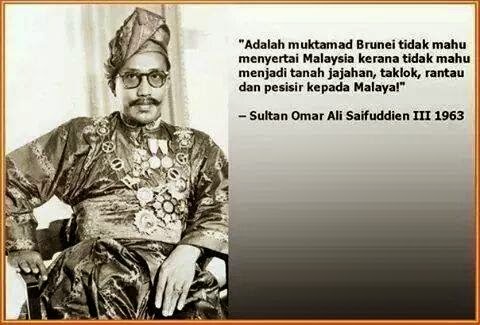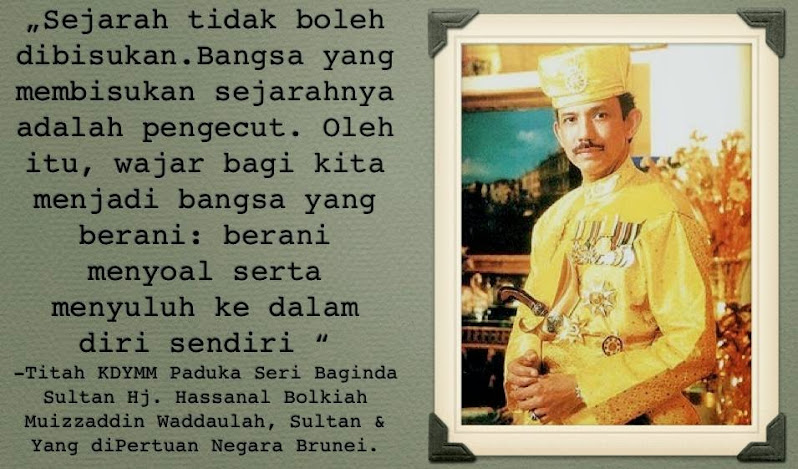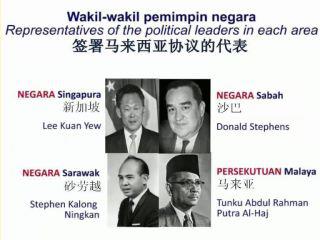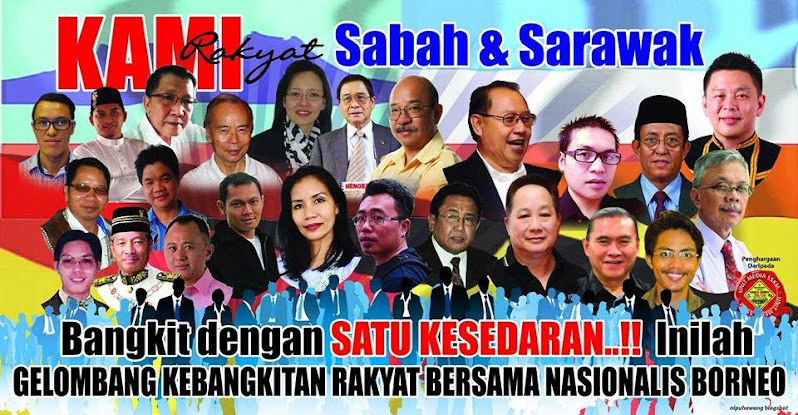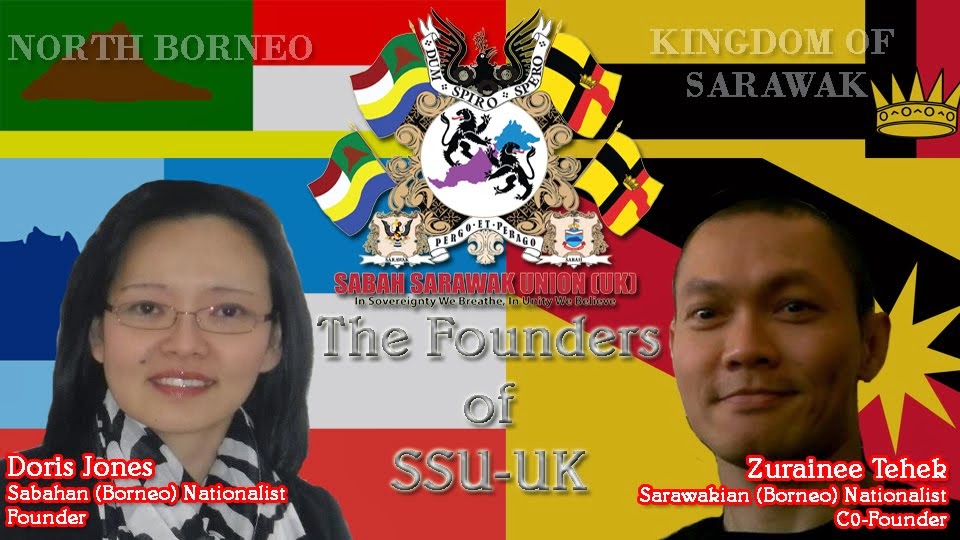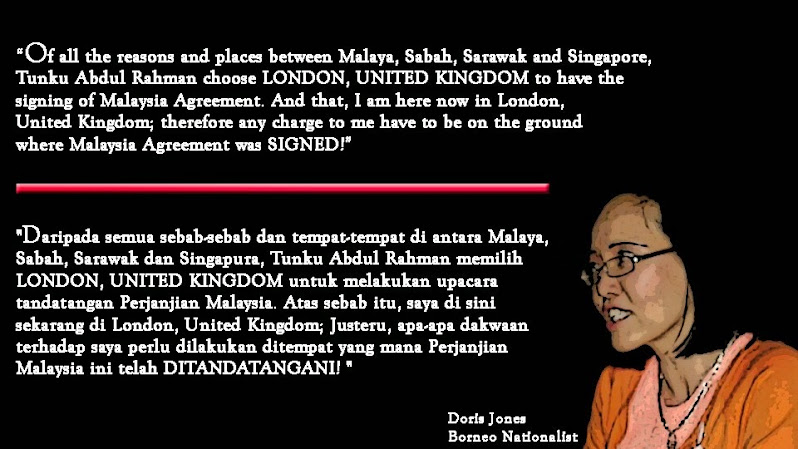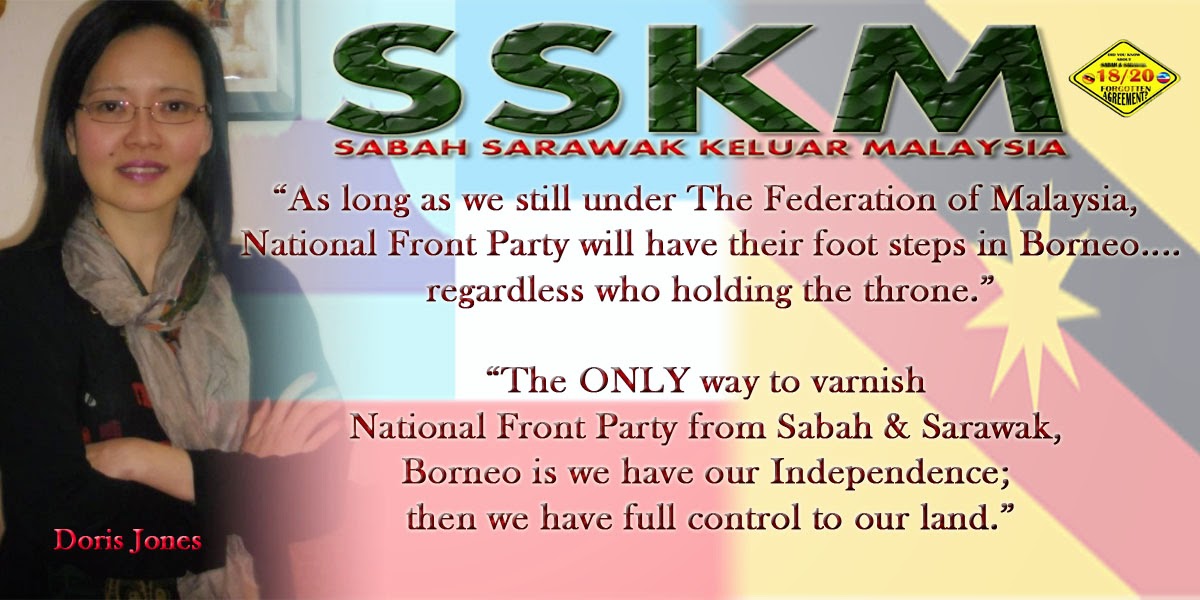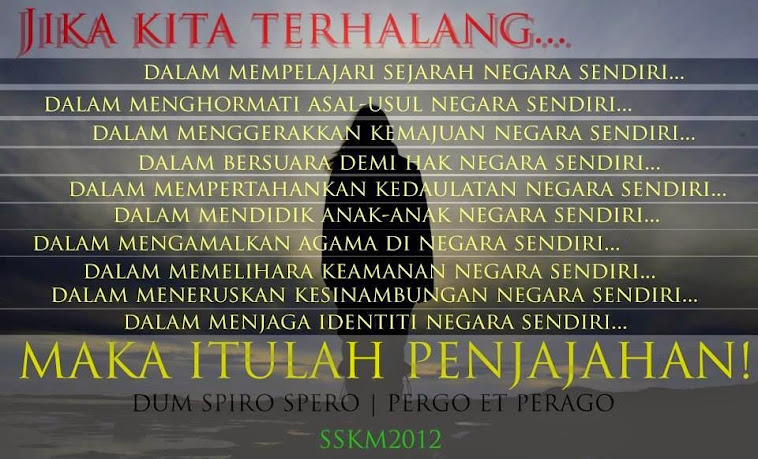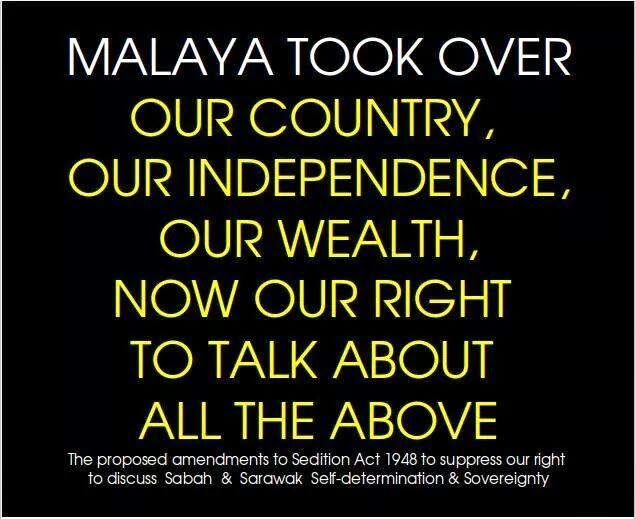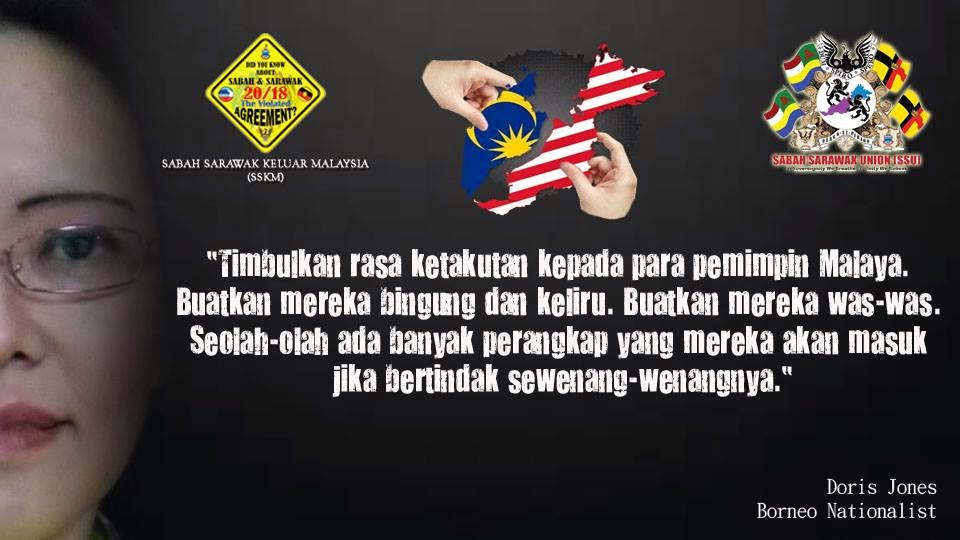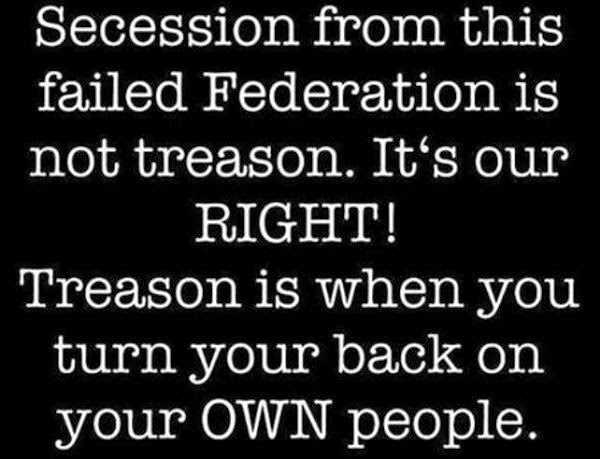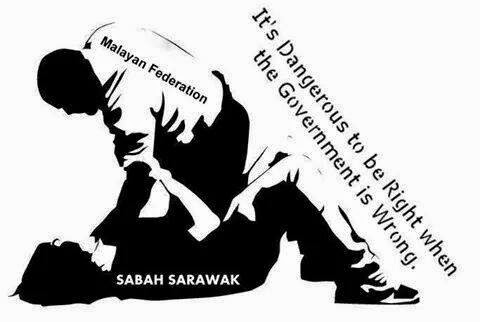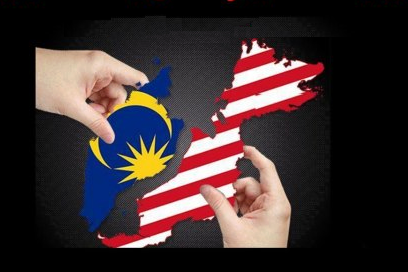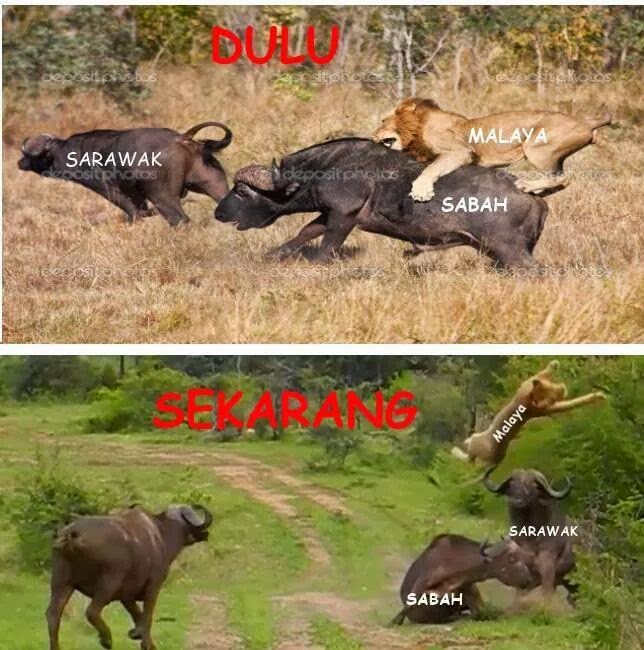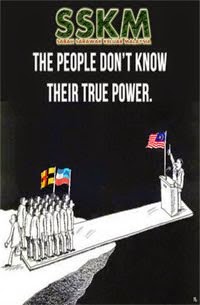Wednesday 14 January 2015
Penghinaan "Siti Hajar Aladin" kepada rakyat Negara Sabah dan rakyat Negara Sarawak sebenarnya dilakukan oleh Akaun Palsu
Pihak SSKM-SSU(UK) ingin membuat satu penjelasan untuk mencerahkan kekeliruan yang timbul hasil daripada satu post yang menghina Bangsa Negara Sabah dan Bangsa Negara Sarawak. Pihak Penama Asal Siti Hajar Aladin telah menghubungi pihak kami dan telah menerangkan hal sebenar.
Penama yang bernama Siti Hajar Aladin (akaun sebenar) telah memaklumkan bahawa mesej yang telah diposkan ke dalam ruangan komen page Facebook Sabah Sarawak Keluar Malaysia (SSKM) dengan satu penghinaan berat terhadap Bangsa Negara Sabah dan Bangsa Negara Sarawak, mengatakan bahawa beliau tidak pernah melakukan perbuatan jahat seperti itu.
Menurut beliau, perkara ini sudah berlanjutan selama hampir dua tahun sejak 2013. Laporan polis dan SKMM sudah dilakukan untuk mengambil tindakan terhadap pemilik akaun palsu tersebut kerana telah mempergunakan namanya demi untuk mencalarkan imejnya namun belum berjaya ditangani.
Terbaru, akaun palsu tersebut telah menghubungi Doris Jones dengan menyampaikan mesej palsu. Berikut adalah keratan perbualan oleh pemilik akaun palsu yang bermesej dengan Doris Jones.
Pemilik nama asal tersebut juga sudah menghubungi Doris Jones untuk menjelaskan keadaan sebenar. Berikut adalah mesej daripada Pemilik Akaun Sebenar...
Dan ini adalah mesej daripada pemilik AKAUN SEBENAR...
"Assalamualaikum. Mesej ini daripada owner FB original Siti Hajar Aladin.. Fake account telah muncul lama dahulu.. Sejak akhir 2013... Fake account wujud selepas saya menghantar surat kepada Perdana Menteri Malaysia.. Mungkin ada pihak tidak berpuashati dengan surat saya tulis kepada Perdana Menteri.. Setelah itu wujudnya beberapa fake account.. Dan hanya fake account yang menhina SS ini tidak dapat di delete.. Pada April 2014 laporan polis pertama dibuat berserta laporan SKMM.. SKMM mengatakan bahawa facebook di luar bidang kuasa SKMM.. SKMM minta saya untuk saya email ke facebook.. Saya telah lakukan.. Tetapi tiada feedback dari pihak facebook.. Report juga telah dibuat oleh rakan-rakan saya tetapi masih juga tidak di remove dari FB...
Pada bulan Sept 2014, fake account mencetuskan kontroversi apabila dia post tentang perkauman Sabah Sarawak sehingga menyebabkn perbalahan seperti yang dilakukan sekarang... Police report juga telah dibuat tetapi tiada tindakan...
Minggu lepas dia cetuskan semula kontroversi yang sama menyebabkan SS menyerang saya sedangkn kenyataan tu keluar dari fake FB, bukan dari saya..
Perbualan yang fake account dan Doris itu satu penipuan.. Saya tidak disentuh mahupun di raba oleh sesiapa.. Saya tiada di KL sehingga malam tadi.. Bagaimana fake kata kata saya berada di KL? Saya baru pulang dari Mekah dan kemudian terus ke Kelantan.. Dan tiba di KL malam td.. Dan hari ini saya berada di rumah kerana on medical leave... Secara logic, bagaimana seseorang itu dia tahu dia diraba oleh siapa?? Memang tak logik..
Jika dilihat, fake account kerap mengeluarkan cerita berbaur lucah... Tetapi masih ramai terpedaya dengan fake account...
Saya telah attachkan police report tetapi ramai kata saya buat laporan tipu kerana sudah takut.. Sedangkan kalau dilihat 2 laporan saya berbeza waktu dan berbeza isi kndungan.. Saya hanya menggunakan satu FB sejak dahulu lagi..
Saya harap warga SS dapat menilainya.."
Justeru, pihak SSKM-SSU(UK) berharap agar pos penghinaan tersebut tidak lagi disebarkan kerana ia dilakukan dengan niat yang jahat untuk menimbulkan konflik yang jahat diantara rakyat Bangsa Negara Sabah dan rakyat Bangsa Negara Sarawak dengan bangsa malaya. Marilah kita bersama-sama membuat aduan kepada akaun palsu tersebut agar ia dapat di "remove" daripada Facebook ataupun "block" akaun tersebut daripada terus menabur fitnah yang jelas telah menganiaya pemilik akaun yang sebenar. Daripada pemerhatian, akaun palsu tersebut sangat pandai melakonkan watak seolah-olah dia adalah pemilik akaun tersebut.
Sebarkan info ini....
***Maklumat ini telah dikongsikan oleh Admin Page The future of Sabah/Sarawak and the Federation of Malaysia***
Wednesday, January 14, 2015
Agreement of Malaysia
,
British
,
Exposing the Truth
,
Fact
,
Federation of Malaysia 16 September 1963
,
Hindraf
,
Sabah
,
Sarawak
,
Sharing
No comments
Malaysia Agreement Act 1963
By Patrick Anek Uren
The topic we are discussing today, MALAYSIA AGREEMENT 1963, is one which is almost 51 years too late, or an old issue that had not been openly discussed since the birth of the Federation of Malaysia.
This discussion of the topic in an open forum such as this one today is indeed is a milestone in itself. And I express many thanks to the recent bold move on the part of the federal government before last GE13 in removing the manyarchaic and inhibitive laws in the field of public discourse, for the change. In the past public discussion of issues,although might be considered of national interest affecting everybody, were not encouraged. Nay, it was a taboo to hold public forum on this issue before.
I consider the mood in the air of the local scene has become more relaxed as well. My enthusiasm as such is under scored by two (2) recent developments:
(i). The State Government under our former Chief Minister who is now our Tuan Ter-Utama Yang di-Pertua Negeri Sarawak, Pehin Sri Taib Mahmud, had seen it fit and timely, and did for the first time, and it was last year 2013, held a grand dinner party in commemoration of the occasion of Sarawak’s Independence granted by the British on 22nd July1963.
(ii). During the recent Balingian By-election Sarawak’s new Chief Minister, Datuk Sri Adenan Satem, spoke about “Sarawak is for Sarawakian”, ie when he retorted to criticisms that a number of personalities from PKR Malaya were barred from entering the State to campaign in the by-election. These two recent events aforesaid are important milestones in the pages of our history by themselves, if not, signalling a new beginning, or an awakening of sort, of an openness of a kind.
Without further ado I move now to talk on the topic on hand – Malaysia Agreement 1963.
The premise
This short talk I will deliver is premised on a view which is now gaining more traction among the people: On the one hand Malaysia from its inception has always been about British economic interests would be better served in the short and long term were former British Colonies in South East Asia: Sarawak, Sabah, Singapore, to merge with Malaya in one entity, Malaysia. And, on the other hand it served the long term Malayan’s economic interest as well.The underlined reasons for this expectation on the part of the British are that: (a) during the colonial period their interests in this part of the world had always been serviced from their bastions in Malaya and Singapore, in the latter was housed the office of the British Governor-General – logistical consideration; and (b) investments and trade,import/export of goods and services between Britain and/in the region had mainly conducted in Singapore which had developed as a regional hub of the British Empire’s commerce and industry.
An opportunity for Malaya
On the part of Tunku and the leadership of Malaya, given Malaya had attained its independence on 31st August,1957, it was a case of a window of golden opportunity not to be missed. At that point in time, after the bitter experiences of the 2nd World War, and on the wake of United Nation’s Declarationon Decolonisation in Resolution 1514 (XV) plus the threat of advancing communism, real or imagined, after it had taken root in China under Chairman Mao, which had caused much fear and concern to the “free world” there was increasing and yet greater impetus to a sense of a need for alignment among nations for security assurances.
Malaysia as a concept was promoted in that environment. Malaya offered itself as a beacon of hope, so it was often boasted about.
In reality, if it could get what it wanted prospect for manifold gains in the long term would be assured. Indeed Malaya potentially had a lot to gain in Malaysia. With the British’s withdrawal as a colonial master the vacuum has to be filled up. Malaya offered itself to the British to be the vacuum’s filler.
And the British certainly did not want to just leave. Their business and economic interests were foremost in their mind. The plan was that in Malaysia their business and economic interests could be secure. And the handling of the then threats to security posed by the communists could be better managed and focused. The establishment of the Commonwealth of Nations is just a case in point.
On the other hand the British then felt they owed it to people of Sarawak who had in 1946 objected to cession of the sovereignty of Sarawak to Britain by 3rd Rajah Sir Charles Vyner Brooke. And they had wanted a self-rule.
Between Malaya and Britain Malaysia would serve a useful purpose and need, albeit respectively divergent, at that moment of time.
I would not serve my purpose being here today if I do not say this. Malaya through Tunku’s vision had already foresaw a great reward was awaiting. Deep in his mind he did not offer Malaysia as a concept to help Sabah and Sarawak economically. Neither did he ever care about helping out the British whose empire was crumbling as a result of the WWII. Instead he envisioned huge profit.
Sarawak had oil at Miri and Lutong during the Brooke’s Regime time. Although by 1961 when the idea of “Greater Malaysia” was mooted oil extractions had halted due to the then technology in use were not yet advanced as today, it was already known by SHELL that potentials for oil were aplenty in these parts of the Borneo Territories, including Brunei.
Indeed Brunei, a tiny conclave, did not join Malaysia although invited to do so. It was advised by SHELL officials that it could survive economically on its oil reserve for a long time into the millennium. And it opted out. Indeed Brunei has survived.
The eventual setting up of PETRONAS in 1975, and in the shape it is, the Tunku’s vision is realized.
Malaysia Day – 16th September, 1963
Malaysia had come to be just as was agreed in, and on the terms set out and agreed between Malaya and Britain at London per the London’s Malaysia Agreement much earlier than Malaysia Day – 16th September, 1963.
Resentment, demand for an independence before Malaysia
And it happened notwithstanding on the local front, the people generally dissented; and in the face of many had voiced out their feelings against it. There was then a common concern that Malaysia would be a case of Sarawak leaving one colonial master to join another: from being a British’s colony to a Malayan’s colony. Yet there were many who expressed such reservation about it and had wanted to see Sarawak achieving own independence first.
Sarawak history
My view is that the history of Sarawak is replete with cases of expression of demand to be free. Let me take us back in time although briefly.
Brooke’s era
To better understand their want of independence first, let go back to 1839 – the start of the Brooke Regime. It is also the beginning of Sarawak’s modern history.
According to a book by Hugh Low the Chinese in Siniawan had rebelled against the power that be then at the now Kuching in 1839. They did not want to pay taxes.
James Brooke accompanied by a British ship ‘HMS Dido’ under Captain Keppel full of Indian soldiers happened to be in town now known as Kuching (it was then a small riverine settlement) then. He was requested to quell the rebellion. And he did. With the support of a number of men of Singai, my great forefathers, the rebellion was crushed.
The rebellion was a tame affair actually. When the rebels saw men of Singai were with the Brooke’s forces they gave up the fight. The Chinese in Seniawan and Bau and Buso had been friendly with the people of Singai long before that,been working in the gold mine at Bau for ages before James Brooke’s arrival. The rebellion ended with little or almost no bloodshed.
That peaceful outcome pleased the power that be in Kuching. And James Brooke was given to rule over the length and breadth of the now known as Sungai Sarawak and its hinterland areas.
For the Dayaks of Singai who helped James Brooke to quell the rebellion at Seniawan, and they helped to save him when his new wooden Astana was burnt, they faded in oblivion after the two incidents.
And it is also mentioned by Hugh Low in his book that a Bidayuh Si-Padungan community had a number of longhouses at that time at where the present Hilton and Pullman Hotels are situated. This may explain the wherewithal the men of Singai came from to rescue James Brooke from the burning Astana and swam him across river to safety.
“Sarawak” The word "Sarawak" had become known officially as the Brooke Regime told hold over the years. How“Sarawak” came to be, and whether the word was there before 1839, i.e before the arrival of James Brooke, I venture to suggest it’s anybody’s guess. Still many would speculate or postulate that “Sarawak” was derived from two Malay words “Serah” and “Awak” – the giving of the reign of power over to James Brooke aforesaid.
Brooke’s Regime
James Brooke only finally established his regime throughout the length and breadth of what is known as Sarawak today in 1841, that is, after he drove the Brunei forces to until what is Brunei today. A first Council Negeri meeting was conducted in Miri. That laid down the foundation and the beginning of a self-rule in Sarawak under the Rajah that spanned a period of 100 years.
James Brooke did not establish his regime as a conqueror of the local populace. Instead it was declared as a case of his Regime was holding power as trustee for the local people. Independence for this country where the people, the various races, would rule themselves was the ultimate aim.
A very clear case of the deep concern for the people can best be seen during the reign of 2nd Rajah, Sir Charles Brooke. But neither time nor space could permit me to dwell too much on it here. I would just say that during the reignof the 2nd Rajah the system of government took to its refinement.
The people generally felt at home with the system in place. More importantly the people felt they played an important part of the whole establishment. Peace was maintained. And the government did not interfere too much in the life of the people: a sort of laiss’e faire system of government was in place.
2nd World War, 1941 to 1945
The reign of the Brookes was disrupted by the 2nd World War just when Sarawak had drawn up its first Constitution in 1941 under Charles Vyner Brooke, 3rd Rajah. That WWII saw Sarawak and Sabah, Malaya and Singapore were conquered and occupied by Japanese Occupation Forces.
After the WWII the 3rd Rajah Charles Vyner Brooke wrote to the British Government and the King of England to cede sovereignty over the territory of Sarawak to the British. Brooke’s reign ended.
Anti-Cession Movement
The ceding of power to the British’s Crown was generally not acceptable to the local people. Movement of resentment against it were organised everywhere. Anti-cession movement began. People that had become use to the Brooke’sstyle of government felt betrayed by the turn of events – the ceding of power to the British. Those people who could and did express their feelings said that their “independence” was taken away off them.
Under Brooke Regimes the peoples felt they had a self-rule, a sort of an “independence”. They feared the thought of being ruled by a government in Britain would cause the loss of that “independence”.
The anti-cession was serious, very serious stuff. Even the new colonial administrators did not anticipate the extent it had developed into.
The people then turned to Anthony Brooke, then the Rajah Muda, for assistance and help. Apart from the young Rajah Muda had made it to the news in a London Newspaper, of course he could not do anything else.
For our present purpose his statement as reported then is important.
So I quote it here:
“Sarawak is not British and it would be an anachronism if it were reduced from the status of a sovereign independent State to a Crown colony”, declared Anthony Brooke.
The news report continued:
‘He said he would fight tooth and nail the proposal to make Sarawak s Crown colony before the people were consulted under their own Constitution.
‘Brooke was head of the Provisional Government which was dismissed from office last October, without an explanation. He is a nephew of Sir Charles Vyner Brooke.’ (news end).
Anti-cession activists demanded Independence
The anti-cession saw the locals: Malays, and the Dayaks, were united against the transfer of power to the British Crown. The Malays and Melanaus, particularly in Kuching and Sibu, were openly vocal. As regards the Chinese I will come to discuss it later.
First, the Malay Union and Dayak Association of Sarawak, had sent a message dated 7/06/1946 to Antony Brooke,Rajah Muda at 31, Prince Albert Road, Regent’s Park, N.W.8 which read:
“Dayak and Malay communities throughout Sarawak protest against false report regarding cession. We stand resolute against cession and strongly and wholeheartedly desire Rajah of Sarawak must not be ended. We invoke Atlantic Charter points 2 and 3 to uphold our cause for sake of international justice and integrity. We require your Highness and your honoured father to intercede to champion for retention of Sarawak’s independence intact, if necessary even to United Nations Organization till success is achieved……”
Second, a letter signed by Abang Hj. Fadillah and Datu Pattingi Abang Hj. Zaini, then president of Malay National Union was submitted to the 1st governor (British) Sir Charles Arden Clarke upon his arrival at Kuching. It wrote: (quot the relevant passage only):
“….. Rajah Sir Charles Vyner Brooke, however, has sought to cede Sarawak to the British Crown by employing the 1941 Constitution to his own advantage. There was no justice in this act, which constitutes a breach of faith with the people. Furthermore, Sir Charles Vyner Brooke had no power whatever to offer cession. The Constitution was never devised for such a purpose, but was enacted to advance the welfare and progress of the people.”
Third, Barisan Permuda Sarawak under its president Zaidi who later became Sarawak’s 3rd local Governor, also rejected cession to the British Crown. And they protested. That protest led to mass resignation of 338 government employees, mostly Malays, from Sarawak’s civil service.
The mass resignation of mostly Malays officers in the Sarawak’s civil service caught the British Colonial official off guard. They did not anticipate it. However to the Colonial Master, the British, it was dawned upon them the people were serious in their demand for independence.
Sarawak ceded to British
Despite all the protests that took place Sarawak was ceded to the British on 1st July 1946. A new chapter had opened.
On 1st. July 1947 Sir Charles Vyner Brooke wrote a letter to the people of Sarawak, and he said: (quote the relevant passage only).
“I know that there are still some in Sarawak, encouraged by persons living outside the country, who maintain their opposition to what has been done (cession). Their cry is that they have lost their “independence” and wish to recover it. What in fact is the position? You have transferred your loyalty from the Rajah who was like your father to a greater father, the King, who has for so long been our Protector. Your feet are firmly set on the road to true independence.…/continue.
“Your local institutions are being developed, your power to express your views on laws and forms of Government is being increased, and your will gradually approach that goal, already reached by so many peoples who had the privilege of Britain’s guidance, where you will be completely self-governing….”
Later on 21st May, 1951 the 3rd British Governor of Sarawak, Sir Anthony Abell, at his speech at the opening of Council Negeri in Kuching, addressed the issue of anti-cession, and said:
“Finally, on this point, I think it is worth my while to state what the Prime Minister said in his telegraphic reply to theformer anti-cession associations in Sarawak. The Prime Minister took the opportunity to reaffirm “the unqualified determination of His Majesty’s Government to guide and assist the people of Sarawak in their progress towards self-government within the Commonwealth…..In the future as in the past, it will be freely open to all in Sarawak to express, in a constitutional manner, their views regarding ways in which progress towards self-government is to be realized, and any views expressed by bodies substantially representative of the people of Sarawak would receive the fullest consideration of His Majesty’s Government. The constitutional form which progress towards self-government in the British Commonwealth should take could only be settled in the circumstances of the time.”
United Nations Declaration on Decolonization
United Nation’s Resolution 1514 (XV) was passed on 14 December, 1960. This triggered the acceleration of, and the mechanism that demanded of the colonial powers to hand back powers to their colonies – territories under their colonial administration were to be granted full independence, went in full gear. By this UN’s Resolution 1514(XV) Britain was under an urgent international obligation to grant Independence to Singapore, Sarawak, and Sabah especially after Malaya was granted its full independence on 31st. August, 1957. Against that in the backdrop, let’s bring some highlights on the British’s idea during the period preceding Malaysia:
British’s desire of Malaysia
An excerpt from a letter from a British Governor to the Colonial Office in London says: “Furthermore we have obligations to the latter (Borneo Territories), and in the case of Sarawak taken from the Brooke Rajahs and solemnly repeated in 1956 Constitution. Two of these “Cardinal Principles of the Rules of the English Rajahs”, run:
- ‘That Sarawak is the heritage of Our Subjects and is held in trust by Ourselves for them.
- ‘That the goal of self-government shall always be kept in mind, that the people of Sarawak shall be entrusted in due course with the governance of themselves, and that continuous effort shall be made to hasten the reaching of this goal by educating them in the obligations, the responsibilities, and the privileges of citizenship” In a letter sent to Colonial Office, London, dated 16 September, 1961 from Singapore:
(i) In my letter of August 24, I said that I thought the time had come when it was necessary to consider a crash programme for “Greater Malaysia”. I should like first to recapitulate the various reasons why I consider that such a programme is necessary.
……..that I believe that Greater Malaysia” should be an important factor for stability in the area and that it would satisfy long term British and Commonwealth interest.
……..that unless Greater Malaysia can be achieved in the near future, the opportunity may be lost for good.
.……..if we do not bring the Borneo territories in now ( i.e. by 1963 – 64) so that the Greater Malaysia plan fails, the long term alternatives for them would be independence”……
MERGER IN THE PLAN
In a letter from Secretary of State for Colonies to Governor of Sarawak sent 15/9/61:
“We believe British interests will be better served by a merger between Singapore (1/g/c) Federation. What we are trying to save is not Lee Kuan Yew but MERGER. If MERGER IS NOT AGREED IN THE NEAR FUTURE we can be pretty sure Lee Kuan Yew will fall. If however he can get agreement with H.M.G. and the Tengku on a date for MERGER he may be able to survive long enough to see MERGER implemented.”
A telegram message from British Governor in Jesselton (now Kota Kinabalu) dated 30/03/1962, he wrote:
“According to yesterday’s Straits Times the Tunku thinks his two speeches in Singapore have cleared the way to MERGER.”
In a telegram from Secretary of State for the colonies on 24/9/61:
“Tunku’s letter suggests period during which present option of merger remains open may be short although I believe Tunku is very aware of importance of achieving his objective.
“If Lee Kuan Yew is forced to a general election before merger, Barisan Socialist will almost certainly get in with a clear majority and it is hard to see how merger negotiations could continue. ………..
Once merger is achieved the extent of the damage which Barisan Socialis can inflict is so greatly reduced that the situation need not be unduly disturbing.”
British’s economic interest
In a Minute from Mr. Sandys to Lord Snowdowne regarding with the Tunku about the transfer of power on 20/07/1962; he said:
“Britain’s own interests are very much identified with the continuance of Malaya’s prosperity. We estimate our private capital investment in Malaya as about $400.0 million. This compares for example with $335.0 million for India. Our export to Malaya are of the order of $60 million per year. We have therefore, a very big financial stake in Malaya.”
Tunku did not want “independence” for Borneo Territories
Britain listened to Tunku who did not want to grant separate independence to the territories of Singapore, Sabah, and Sarawak. Tunku did not want a merger.
He wanted the Borneo territories to join those 11 states already in mainland Malaya. Except that he was prepared to accept the special position of Singapore, a City State.
A letter from Colonial Secretary to the U.K. Commissioner for South East Asia, Singapore dated August 31st 1963, ona Statement of Facts, paragraph 4. (b)., it said:
“that the British Malaysia Act (which comes into force on September 16) provides for the transfer of British sovereignt over Singapore, Sabah, and Sarawak to the new Federation of Malaysia but does not provide for the separate independence of these territories.
On his part Tunku was very unhappy at the idea of internal self-government of these territories. He said in a letter to Britain’s Prime Minister MacMillian; he said: (quote)
“….The Malaysia Agreement, as varied on the question of Malaysia Day with the concurrence of our governments, provision for Her Majesty to surrender sovereignty and jurisdiction over these territories in accordance with the constitutional arrangements set out in the Agreement. The granting of internal self-government is not part of the arrangements and seriously undermine the whole basis upon which these territories were to enter Malaysia.
“Apart from its legal and constitutional implication, this step has caused considerable apprehension to mygovernment which is now faced with a situation in which the State Governments have been given powers in relationto matters which, if Malaysia is formed, will be federal responsibilities”.
While the above quote can be interpreted as his concern over territorial waters and what lies beneath it including oil and gas, it also mean he was concerned that as independent Borneo Territories the need for setting up embassies abroad and taking part in the league of nations as equal among equal could only be problematic. Then the two Borneo Territories were not yet ready.
Still the above quote reflected a major shift in the mind of the Tunku. Maybe he was pushing the issue because 1963was already agreed in London earlier.
Before the London Agreement in his declaration to Parliament of Malaya on 15/10/1961 Tunku said:
“One strong feeling in the Borneo Territories was that they must be consulted. I feel that they have the right to be consulted on the future of their people and the future of their country. I have said on more than one occasion that Malaya can only accept Borneo people from an expression of their own free will to join us.”
In the same context, ie after the London Agreement on Malaysia, though, Tunku had different words regarding then SUPP’s opposition to Malaysia. He said: “In Sarawak recently statements were made by a member of SUPP that the party did not want a merger with Malaysia, because this would make Sarawak a colony of Malaya, and it was better to get independence separately first.
“Opposition by such people to the concept of Malaysia arises not from any fear or suspicion which they openly express, but from fear that the Communists would have no more grounds for inciting discontent or creating trouble as they have tried it here unsuccessfully. You can see therefore that the pattern is the same: the Communists will work in every way they can to oppose a merger and the concept of Malaysia.”
Tunku was apparently referring to reported statement by President of SUPP, Ong Kee Hui (Tan Sri) by a local Newspaper; where the latter said:
“We have all along held the view that Sarawak belongs to Sarawakians and the British Government must hand over sovereignty of this country to the people of Sarawak.
“This was in fact what the British government had pledged to do when it took over Sarawak, and independent country with its own Rajah.
“The proposed Federation of Malaysia which envisages the transfer of sovereignty of this country to Malaysia is a denial to the people of Sarawak of their right of self-determination and does not give the people true independence,and therefore we are firmly opposed to it.
“We may soon pass away, but our children, and their grandchildren would perhaps ask us to account why at that time – 1963 – did we make such a decision. I do feel that if we really want to be free , and independent, there is no reason why we must join with another country which is already independent. It is nothing but an integration of the country with the Federation of Malaya…I say the British government has let us down, and has in fact handed us to Malaya.”
Cobbold Commission
The concerns expressed by local people led to Cobbold Commision was set up to determine the wishes of the people of Borneo Territories to Malaysia.
That Commission after only a short period of going down to the ground, and mainly through official channels, District offices, etc, “affirmed” the people accepted Malaysia.Still the people wanted further assurances. Apart from SUPP that was vocal and articulate in the presentation of its views, new Parties like SNP (SNAP), PANAS, and BERJASA had all wanted a form of reassurances before merger with Malaya to forming Malaysia.
18/20 points agreements
This led to the 18 points agreement for Sarawak, and 20 points agreement for Sabah were formulated. The peoples of the two Borneo territories demanded of the British that these 18/20 points agreements were to act as pre-agreement to, and their terms incorporated in the Malaysia Agreement.
I must pause for a moment here. Sarawak parties, according to the record, did not submit the draft 18 points agreement to IGC which considered the terms of the Malaysia Agreement. Only Sabah parties did submit their 20 points agreement to IGC. Anyway between the 18 points (Sarawak) and the 20 points (Sabah) there are much similarities, with few exceptions.
In any event however what the peoples expected above to the dismay of many were never to be realized. And apart from the matters of immigration, use of English, freedom of religion, and labour which until today they still do, and remain with Sarawak, my take is that generally the 18/20 points agreements never did matter seriously to the Tunku and to all the federal leaders who took over after him.
Malaysia came to be with two major developments:
First:
- Sarawak independence was granted on July 22nd. 1963 .
- Malaysia Day on 16th. September, 1963.
Sarawak’s independence had preceded the merger with Sabah, Singapore, and Malaya to forming Malaysia. This step so taken, put to a halt, albeit temporarily, the allegation of “selling out” to Malaya against the British.
Second:
On the other hand although Tunku apparently had lost control over things in that he at first did not want the Borneo Territories to be independent first before Malaysia, and inasmuch as he did not want a merger with, but both Sarawak and Sabah obtained their respective independence: Sabah was granted independence on 31st. August, 1963; 16 days earlier than Malaysia Day, however Tunku got what he set out to achieve in the first place. According to the London Agreement the British Government agreed to surrender the sovereignty of the Borneo Territories to Malaya. It was not to be a merger.
And Tunku had gotten what he had wanted when he said on 8th July 1961 (2 years before Malaysia): (quote)
“When I said Federation with the Borneo Territories, I mean that they should be the same as the other states of Malaya. We have 11 states that form the Federation of Malaya and if the Borneo Territories decide to come in there will be 14 – all enjoying absolutely equality, one with the other.”
Malaysia was a sell-out to Malaya by the British?
- Malaysia constitution was based on Malaya’s Constitution although with modifications,but only slightly, where by our head of State was titled “Yang di-Pertuan Negara”.
- By 1976 there was a change to our Constitution and then the title of office was changed to “Yang di-Pertua Negeri”.
The question is, are we equal at all, or is there any equality?
Ningkan’s dismissal by Federal declaration of Emergency in 1965
Ningkan started his party SNP (later became known as SNAP) on a platform seeking full independence of Sarawak from the British. His call was “Sarawak for Sarawakian”. And he was Sarawak’s First Chief Minister. Incidentally he was very enthusiastic about Malaysia. He expected more development fund would flow in. In a radio broadcast he said:
“The Malayan Government, the founder of the Malaysia project, is ever willing to help us, and its sincerity will be proved by pouring in millions of dollars into this country after Malaysia takes shape at the end of August this year.”
And I would say he was also the first Chief Minister removed from office by Federal powers in 1965. After been removed from office by the Governor, and then won his case in High Court in Kuching a State of Emergency was declared. Thereby Ningkan was out permanently. Tawi Sli was put in charge, although I would say only just. Sarawak was effectively administered by Kuala Lumpur through the office of a Federal Secretary.
To many this event signal led the end of an Independent Sarawak that had with independent Sabah, and Singapore merged with independent Malaya as most people had initially wanted/thought to be.
That event also signal led Tunku’s expressed wishes aforesaid coming home to roost.
Containment of communists was the “underpin”
Communists and the spread of communism were the common bogeyman at that time. Without saying too much here for want of time, I would say that the common use of the said bogeyman had helped consolidate a federal hold on the people. That also reduced the spread of sympathy to Ningkan over the treatment meted to him, his dismissal from office by federal powers.
Tun Rahman Yakub, 3rd Chief Minister. Rahman was with the Federal government during Ningkan’s dismissal. And after he was elected to State Assembly in 1969 G.E that was postponed due to the infamous May 13th of 1969 in Kuala Lumpur to the following year in 1970, Rahman Yakub was appointed Sarawak’s 3rd Chief Minster.
Then and only then, and only gradually, did Federal powers gripping Sarawak began to thaw. Most significantly CM Rahman Yakub, I believe it was with the blessing of Federal government under PM Tun Razak, signed a peace treaty with Bong Kee Chok, head of the communists that led the insurgency in Sarawak, in 1973, in what is known as Sri Aman Treaty. The other major player in this was late Stephen Yong, the SUPP’s Secretary General, an MP and a member of State Assembly. It was followed by a Coalition government was formed. Mr. Ong Kee Hui was made a Federal Minister.
Our land mass reduced to within 3 mile from the shoreline by 1965 Emergency Proclamation
Following the declaration of emergency by which Ningkan was dismissed from office (the official version behind that emergency’s declaration was to contain communism) there was a major development behind the whole facade. The State’s continental shelf which by international convention and law of United Nation is up to 12 miles from shore line was reduced to 3 miles from shoreline as declared in that emergency proclamation (of course for “logistical reasons”officially).
This power over Continental Shelf/territorial waters principle with regard to Sarawak, after PM Najib has recently removed that 1965 Emergency Order (Sarawak) along with the 1969 Order (May 13th.), the territorial waters’ principle aforesaid was incorporated in Act 750 passed by Parliament recently.
The significance of this development (3 miles limit of land right) is that the remaining 9 miles of land under territorial waters is under the Federal Government’s jurisdiction. What Sabah and Sarawak get of the 5 percent from oil revenue from PETRONAS is 5 percent of what is derived from within the territory up to and until the 3 miles limit of the sea from the shoreline. The revenue from the 9 miles of territorial waters goes to Putra Jaya’s coffer.
And until today there is little or no explanation has been given about the law that limits us to getting only what is derived from within 3 miles from shoreline aforesaid. Maybe those who walks in the corridor of power might know of it but by reasons known to them the people are not informed.
PETRONAS ACT 1975
After Sri Aman Treaty of 1973, and with that signal led an end to any vestige of communism, the Federal Government had enacted Akta Petroleum Nasional (PETRONAS) in 1975. Afterwards PM Tun Razak declared the vestment of powers over oil and gas in Sarawak and Sabah to PETRONAS. Under the Act Sarawak and Sabah are accorded 5 percent of whatever revenue from these resources.
One significant factor here is that there was no resolution approving the conferment of rights to PETRONAS was ever passed in the State Assembly. However the respective Chief Ministers of Sabah and Sarawak gave their consent to that.
1976 constitutional amendment
As I have said above, the 1976 constitutional amendment significantly brought final closure to any claim of independent Sarawak and Sabah in a merger with Malaya forming Malaysia.
The two Borneo Territories have become just another 2 new states with those 11 other pre-existing states of Malaya.Just as Tunku had wanted it, as I narrated above – (repeat below)
“When I said Federation with the Borneo Territories, I mean that they should be the same as the other states of Malaya. We have 11 states that form the Federation of Malaya and if the Borneo Territories decide to come in there will be 14 – all enjoying absolutely equality, one with the other.”
Parity of development, or lack of
Many are questioning the issue of “all enjoying absolutely equality, one with the other”. Yet many disbelieve that call.Such disbelief is strengthened by what people are seeing in the vast advancement in term of development in Malaya compared to the lack of it in Sarawak. For example there is already a talk of an “elevated Highway” which will cost multiple of billions of Ringgit to alleviate the acute road congestion in Selangor and Putra Jaya. And compare that with a recent statement of Tan Sri James Masing, Sarawak’s Senior Minister, where he lamented the lack of good communication links to Kapit and beyond during a presentation ceremony of aid by PEKEMA held at Kapit (as reported in the local issue of “Borneo Post”). Thus the question ‘why this disparity’ rages on. And correspondingly the question why this state of situation is so despite all the initial promises of something good would be forth coming through Malaysia increases in volume as time goes by. Likewise the question if joining Malaysia was correct gains further traction among people.
Legal’s avenue shut
Otherwise, however, all avenues to demand for more are pretty shut legally, given what is narrated above.
And definitely I do not think our Malaysian Courts would entertain a case of even asking for a review of the Malaysia Agreement. Kelantan’s claim for a share in revenue but oil is derived from offshore beyond the 3 miles limit has been rejected.
And going to ICJ would only be possible if such a request comes from the government of a country.
So that possibility is shut.
Suing the British Government for having handed the Borneo Territories as it did might be purely academic. And in this you may care to look at the Ningkan case (about his dismissal as a Chief Minister in 1965) that went right up to the Privy Council in London. As well as the Sinyum Mutit case on his termination as a Member of Parliament to the Constituency of Bau-Lundu (now Mas Gading) based on the issue of his pre-signed letter which was kept by, and which upon his resigning from his party SUPP, was tendered to the Speaker which case also went to the Privy Council.
My take on both cases the issue of fait accompli was the rule by which both cases were dismissed.
In this context may I quote what late Tun Jugah told us at his then official residence as Federal Minister for Sarawak Affairs at Crook shank Road (opposite the present Sarawak general Hospital), sometime in 1965 before Ningkan’s dismissal; In Iban Language in answer to a question “would Malaysia last?”, he said:
“Tu baka paku rawang pasok ba pala tiang rumah, agi lama agi tegal, tussah ka cabut enti nak pala tiang rumah nyapecah baru ka” – (meaning ‘liken it to a piece of iron nail which when already sunk into the head beam connecting to the main pillars of a house will be difficult to pull out unless the beam and the main pillars are broken down.”)
This above is a statement coming from the only person from the Dayak Community who together with 3 local Malay local dignitaries signed the Malaysia Agreement on behalf of Sarawak and its people. I was there in his official residence at that particular evening when he said that.
The above late Apai Jugah’s statement must also be looked at through the prism of limitation.
Political Avenue
I would suggest that the only avenue for us to demand maybe an upgrade in revenue from oil and gases, and for other concessions, particularly more development fund to develop our state’s still poor infrastructural facilities, for example, just maybe, can be through politics. I would hasten to add however that this need a concerted effort of everybody, and every political groupings, for anything to be realized.
Although I must still add that our demands for more fund, and especially for bigger share from the revenues derived from oil and gas, are only proper and legal because of our right to these resources by virtue of they are resources taken from our own land – refer to State List in the Federal Constitution, and as well as those incidents of pre-Malaysia, and after endorsement of Malaysia Agreement 1963 was put to in bold ink, as narrated above.
BN’s fixed deposit
The recent 2 general elections of 2008 and 2013 are cases for optimism. Without the support of people in Sabah and Sarawak the Federal Government would probably be in different hand. The parliamentary seats won by BN in Sabah and Sarawak made the day for Federal BN holding power in Putra Jaya. Hence PM Najib coined a new term “fixed deposit” for this new development. A hitherto banking terminology has become a political term. While the term aptly describes this new development i.e BN’s hold at PutraJaya could not do without support garnered from Sabah and Sarawak, it has brought in a new political dynamism to the power equation as seen in a result of, and brought about by the recent two (2) Malaysia’s Elections – GE12 and GE13.
I believe this new trend, although “fixed deposit” it has had been called by, is worrying to the current power that be at PUTRAJAYA. More so with the often stated “invincibility” on the part of some if not all of Federal leaders.
Window of opportunity
And I believe this new political dynamism offers a window of opportunity for the people of Sarawak and Sabah: atleast to bargain for more development funds and other concessions, not to mention for a bigger share in and controlover oil and gas exploitation, extraction, and their revenue.
PM Najib did mention of 20 % of revenue
Already PM Najib did mention about the possibility of increasing our share of revenue to 20 percent. It was reported in the local papers pre-GE13 period.
Although not yet been put into effect a mention of it by our PM Najib as such does show the deep concern over the possibility of power shift at PUTRAJAYA. Hence the concern to maintain at least a status quo, if not better, the issue o“fixed deposit” fore said has come to the fore.
And I also believe that the 1976 constitutional amendment is not correct and as well as Act 750 which took after the 1965 Emergency Order was removed over our territorial waters right that has been reduced to 3 miles from shore line is not consistent to the people’s earlier (before Malaysia)) aspiration. And given Sarawak and Sabah were independent first, on the demand of the peoples of both Borneo Territories, before merger with Malaya and Singapore under Malaysia that came to be by 16.09.1963 we should be accorded shares in oil revenue from oil sourced within 12 miles from shoreline which is our territorial waters. I believe the “fixed deposit” can leverage for that.
Conclusion
The window of opportunity could be fully exploited only by cooperation of all in Sarawak. In this I see the two recent developments in State’s leadership which I mentioned at the start of this talk are encouraging.
Toward this purpose of getting what are ours by our birth right, being born as Sarawakians, I foresee a greater political cohesion among local parties as the way forward may ultimately lead us there. Maybe this effort will take many years down the road. However I am positive given the recent apparent change is in the air aforesaid we are in anew dawn of awareness.
Thank you.
Dated 27th April, 2014.
PATRICK ANEK UREN.
&&&&&&&&&&&&&&&&&&&&&&&&&&&&&&&
SOURCES OF INFORMATION USED BY WRITER:
- DECLASSIFIED PRE-MALAYSIA DOCUMENTS TAKEN FROM LONDON, ENGLAND COMPILED BY MS.LINA SU.,2.
- “HUGH LOW – SARAWAK – NOTES DURING RESIDENCE WITH H.H THE RAJAH BROOKE”.,
- “THE CONSTITUTION OF MALAYSIA” – (ANNONATED WITH CASE LAW CASES) BY SHERIDAN &GROVES – PRODUCED BY MALAYA LAW JOURNAL (MLJ).,
- “CONSTITUTIONAL LANDMARKS IN MALAYSIA” (1957-2007) BY ANDREW HARDING & HP LEE –PRODUCED BY LEXIS-NEXIS.
- “INTERPRETATION TO MALAYSIA CONSTITUTION” BY TUN SUFFIAN – MLJ.
- OWN PERSONAL NOTES.
- PERSONAL EXPERIENCES (WRITER WAS WITH NINGKAN AFTER LATTER’S DISMISSAL; MAS GADINGMP ELECTED IN 1974, 1978, 1982; TASIK BIRU STATE ADUN ELECTED IN 1979; FEDERAL PARLIAMENTARY SECRETARY MINISTRY OF WELFARE, K.L. (1975 TO 1979).
[Disclaimer: The above text titled “Malaysia Agreement 1963” (E&O Excepted) is solely for use at the Forum held on the 27th April, 2014 at HOTEL GRAND CONTINENTAL, KUCHING, organised by Sarawak Association for Peoples’ Aspiration (SAPA). No reference to it outside this context is allowed without written consent of the writer, Patrick Anek Uren, whose address is at M/s: Anek Uren & Partners Advocates & Solicitors, DE202 First Floor, MJC Batu Kawa,93250 Kuching, Sarawak.]
***To download this article, please click this link >>>Malaysia Agreement Act 1963<<<***
Wednesday, January 14, 2015
Independence
,
Sabah
,
Sabah Sarawak Union (SSU)
,
Sarawak
,
Self-Determination
,
SSKM
,
United Nation
No comments
See where MALAYSIA GOES WRONG in UN Congress ?
6 November 2012
GA/SHC/4051
Universal Recognition of Inalienable Right to Self-Determination Most Effective Way of Guaranteeing Fundamental Freedoms, Third Committee Told
General Assembly
Meetings Coverage
Sixty-seventh General Assembly
Third Committee
30th & 31st Meeting (AM & PM)
Hears from Some 35 Speakers in Day-Long Debate,
With Focus on Eliminating Racism, Self-Determination, Human Rights Protections Universal recognition of the inalienable right to self-determination was the most effective way the global community could guarantee protection of fundamental freedoms, the Third Committee (Social, Humanitarian and Cultural) was told today, as it concluded discussion on several human rights issues.
“Whether this right is taken away by military intervention, aggression, occupation, or even exploitation, the world cannot condone its deprivation from any peoples in any region,” the Maldives representative said.
All States facing questions of self-determination must include broader ethnic and linguistic groups in decision-making processes, said delegates, as the Committee heard from some 35 speakers in a day-long debate that concluded its consideration of the elimination of racism, and the right of peoples to self-determination, then moved on to consideration of human rights protections.
The representative from the youngest Member State, South Sudan, said his people’s experiences were “an excellent lesson for the international community” on matters of racism and self-determination, since South Sudanese political parties and personalities had not been consulted in discussions on independence from colonial Britain, which led to distrust and decades of war.
The racial and religious discrimination faced by South Sudan for more than six decades should not have happened, with the Charter and the watchful eyes of the United Nations to guard against such indignities, he said. Nonetheless, despite all the hardship inflicted, South Sudan, which finally became a Republic in 2011, would like to put suffering behind, and seek a good relationship with Sudan.
During the discussion, a number of countries supported realization of self-determination for the Palestinian people, calling on the Security Council to recommend that the General Assembly accept the Palestinian application for United Nations membership and heavily criticizing Israel’s policies.
Malaysia’s representative said he had personally witnessed the suffering of Palestinians under Israel’s military occupation and blockade, which destroyed the economy and minimized employment opportunities in the Occupied Palestinian Territories. “The sooner the solution is found, the sooner members of both sides can find themselves living in peace and security,” he said. “The only option is to make the two-State solution, based on 1967 borders with East Jerusalem as capital of Palestine, a reality,” he said.
The Palestinian observer said Israel had violently withheld the inherent right to self-determination of the Palestinian people, but those people remained committed to peace and had not forsaken their legitimate national aspirations. Israel should not be allowed to continue obstructing and dictating the terms of the Palestinian exercise of the right to self-determination, she said.
Speaking in right of reply, Israel’s representative said that it was committed to advancing the self-determination of Palestinians and to a two-State solution. The Palestinian delegate, among others, had neglected to mention that Israel’s Prime Minister had offered to negotiate with the Palestinian Authority President without preconditions but had been rebuffed “time and again”. If the Palestinian delegate cared about self-determination, she would stop berating his country and start working with it, he said.
In the afternoon, the Committee also resumed its discussion on the promotion and protection of human rights, in which most delegates vowed to continue engaging in the Human Rights Council’s Universal Periodic Review, a cornerstone of the international human rights architecture.
During the debate, the representative of Nigeria said the most severe human rights problems in the world today were caused by poverty, discrimination, conflicts and diseases. Political instability and conflicts, particularly in Africa, were intrinsically linked to economic development, he said, calling for an increase in development and financial assistance to realize the Millennium Development Goals.
The representative of Malaysia, speaking on behalf of the Association of Southeast Asian Nations (ASEAN), said the work of the international community in promotion and protection of human rights should take into account principles of respect for national sovereignty, territorial integrity and non-interference in the internal affairs of States. “Freedom, progress and national stability are promoted by a balance between the rights of the individual and those of the community, through which many individual rights are realized, as provided for in the Universal Declaration of Human Rights,” he said.
The European Union’s representative said 2012 had been a year in which the long path of transition in many countries continued worldwide. “There may be temptations, once power is gained, to refuse to grant to some the full enjoyment of all human rights. But, democracy can only flourish when it gives its entire people, whatever their gender, religion, disability, language or ethnic identity, an equal say and equal rights, guaranteed in law and practice,” he said.
Also speaking today in the debate on racism and self-determination were the representatives of Kyrgyzstan, Iran, Albania, Malaysia, Bolivia, Norway, Syria, India, Costa Rica, Armenia, Iceland, Egypt and Azerbaijan.
Also speaking in exercise of the right of reply were the representatives of Armenia, Pakistan, Syria, India and Azerbaijan, as well as a representative of the Permanent Observer Mission of Palestine.
In the debate on the protection and promotion of human rights the Secretary-General of the Ministry for Human Rights of Burkina Faso spoke, as did the representatives of India, United Republic of Tanzania, Morocco, Viet Nam, Ukraine, Latvia, Barbados (on behalf of Caribbean Community (CARICOM)), Chile (on behalf of the Community of Latin American and Caribbean States), Brazil (on behalf of Southern Common Market (MERCOSUR)), Liechtenstein, Malaysia, Venezuela, United States, Australia, Japan and Lao People’s Democratic Republic.
Exercising the right of reply were the representatives of China, Russian Federation, Democratic People’s Republic of Korea, Cuba, Bahrain, Viet Nam and Japan.
The Committee will reconvene at 10 a.m. Wednesday, 7 November, to begin its consideration of refugees and hold a dialogue with the Office of the United Nations High Commissioner for Refugees.
Background
The Third Committee (Social, Humanitarian and Cultural) met today to continue its consideration of elimination of racism, racial discrimination and related intolerance as well as the right of peoples to self-determination, and to continue its discussion of promotion and protection of human rights.
Statements on Racism and Self-Determination
NURBEK KASYMOV ( Kyrgyzstan) rejected all forms of racism, racial discrimination, xenophobia and related intolerance. He also rejected the recent film entitled “The Innocence of Muslims”, saying also it was unacceptable to direct violence against diplomatic staff. There were more than 100 nationalities in Kyrgyzstan, and one third of the population was comprised of ethnic minorities. In 1994, Kyrgyzstan had become party to the International Covenant on Civil and Political Rights, reaffirming its attachment to equality and non-discrimination. The constitution enshrined equal rights for all. It was pursuing a policy of multicultural education and transparent governance. A council on inter-ethnic development also had been established under the President’s auspices.
Noting that more than 10 years had passed since the adoption of the Durban Declaration, he said implementation of that instrument and its Programme of Action had been unsatisfactory, as racism persisted in all corners of the world. He shared the Secretary-General’s appeal for more political will and stronger measures to reverse the trend of racist and xenophobic violence. Intercultural dialogue and respect for diversity were extremely important in combating such behaviour. Political platforms based on such attitudes should be condemned as incompatible with democratic principles and he urged States to change legislation, guarantee the rule of law and carry out appropriate educational work.
Mr. RAHMAN ( Iran) said the right of Palestinians to self-determination was an inalienable right, yet Palestinians were being deprived the exercise of that right. Flagrant international human rights violations by the occupying Power continued unabated. The international community should not be indifferent to that travesty of justice and humanity. Palestinians deserved liberation and self-determination and international measures had been inadequate. As long as that question remained unresolved, peace could not prevail in the region. The question of Palestine was at the core of the Middle East conflict. The root cause of the problem should be addressed. The final outcome should be an independent, democratic Palestine with Al-Quds Al-Sharif as its capital.
Turning to racism, Mr. ANSARI said racism, in different forms and manifestations, was among the root causes of internal and international conflicts, and threatened ethnic and religious minorities. Racial and xenophobic actions had increasingly targeted minorities, especially Muslim communities, indigenous peoples, immigrants, people with African or Asian origins, and Roma. The growing tendency of politicians to stigmatize people on the basis of religion, race, colour, descent and national or ethnic origin was also alarming. The world had seen a recent upsurge of “Islamophobia” in certain parts of the world, a trend manifested in attacks on Muslim places of worship, among other things. He was gravely concerned at the desecration of Muslim sanctuaries, saying such Islamophobic acts only cultivated animosity among different peoples and nations.
ERVIN NINA ( Albania) welcomed the contribution of the Special Rapporteur in his report on the increased use of the Internet to promote, fuel and disseminate racist ideas. Dialogue among different cultures and civilizations should be seen as an ongoing process that required dedication, goodwill and care. “We cannot permit that the reckless sporadic actions of disruptive groups through the Internet obstruct us from a genuine effort to reach a better understanding of each other in a world everyday more globalized,” he said.
Albania shared the view that the global fight against racism, racial discrimination, xenophobia and related intolerance was an issue that concerned all and in which the international community must be united. But, it was also convinced that the fight against intolerance began at the community level, and no society could progress unless every aspect of discrimination was fought vigorously and continuously.
HUSSEIN HANIFF ( Malaysia) said the long struggle for self-determination still eluded Palestinians, and the expansion of Israeli settlements was tantamount to that country’s encouragement of settler violence against Palestinian people and property. Israeli policies and practices of displacement and dispossession only served to worsen the disempowering and vulnerable conditions endured by the Palestinian people. He urged the international community and the Middle East Quartet to take firmer action to stop the illegal Israeli settlements, confiscation of Palestinian land and resources and demolition of Palestinian homes, property and infrastructure. The practices of administrative detention and extrajudicial execution also required a stronger international response.
*********************************************************************************
malayan: Malaysia’s representative said he had personally witnessed the suffering of Palestinians under Israel’s military occupation and blockade, which destroyed the economy and minimized employment opportunities in the Occupied Palestinian Territories. “The sooner the solution is found, the sooner members of both sides can find themselves living in peace and security,” he said. “The only option is to make the two-State solution, based on 1967 borders with East Jerusalem as capital of Palestine, a reality,” he said.
Bornean say: WE, personally witnessed the suffering of Sabahans under Malaysia Govenrment's occupation and blockade, which destroyed the economy and minimized employment opportunities in the Occupied North Boreno (SABAH) and Sarawak land. “The sooner the solution is found, the sooner members of both sides can find themselves living in peace and security,“The only option is to make the two-State solution, based on 20 Poinsts which had been agreed in 1963 Malaysia Agreement ! Full stop!
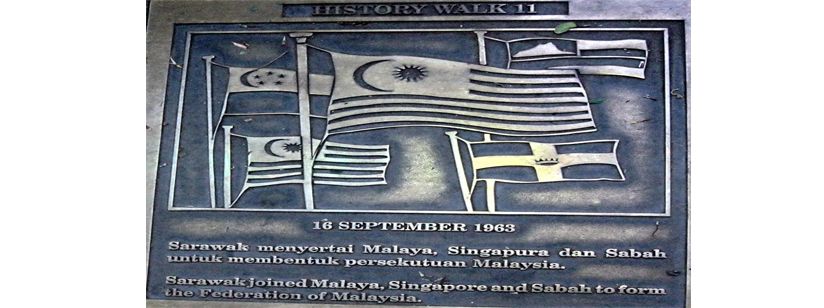
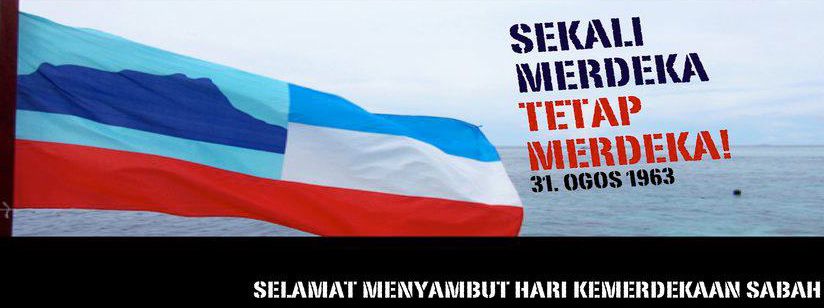
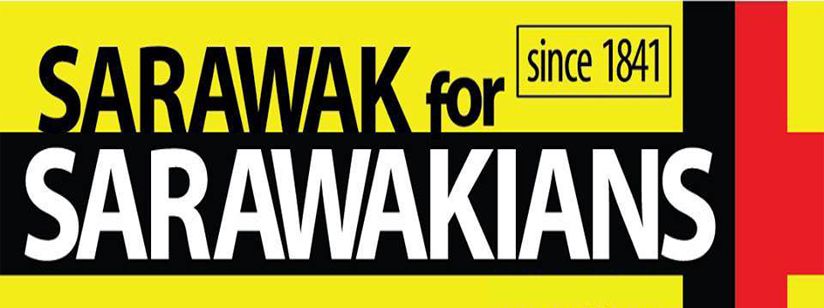



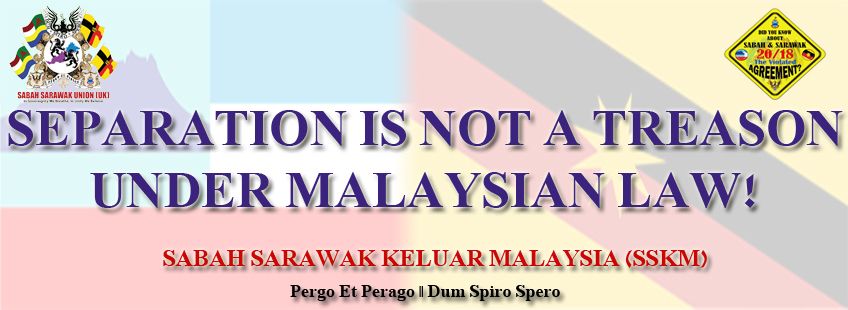
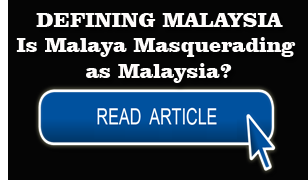
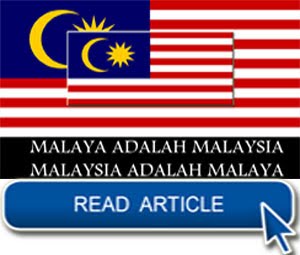
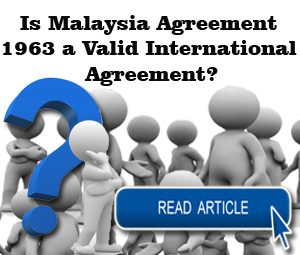

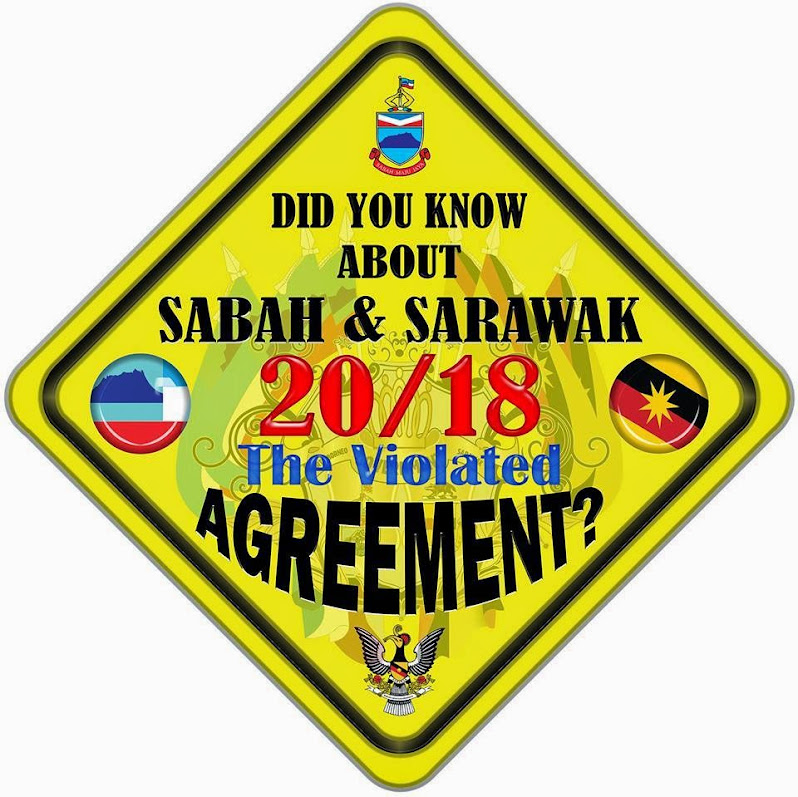
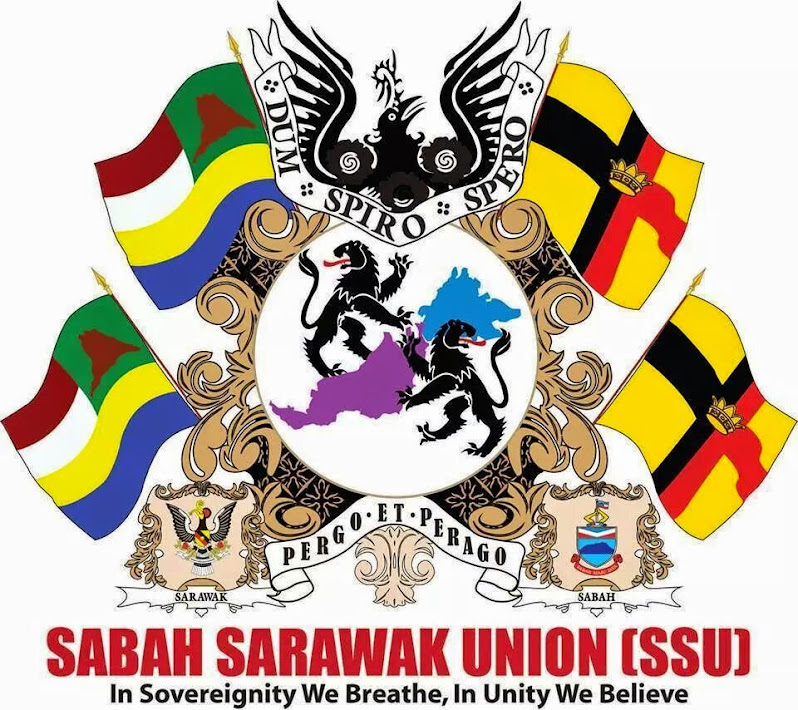
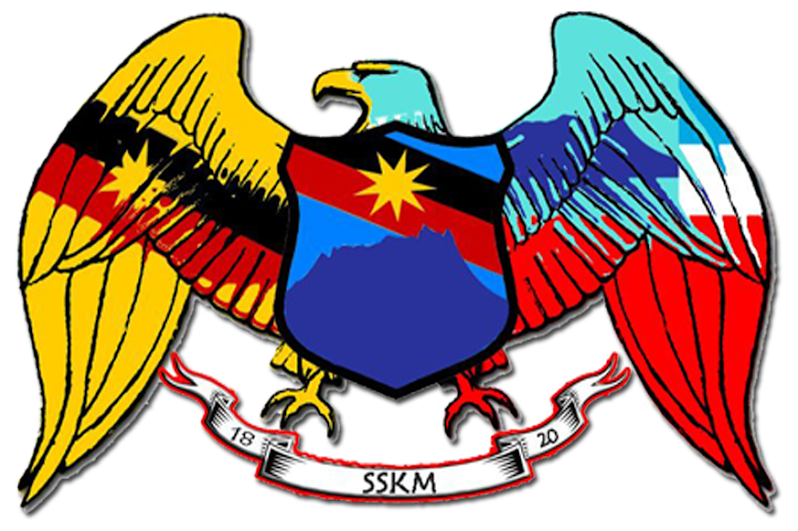
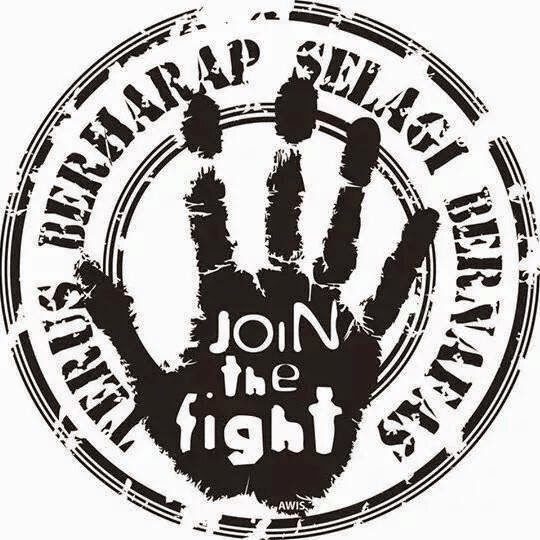
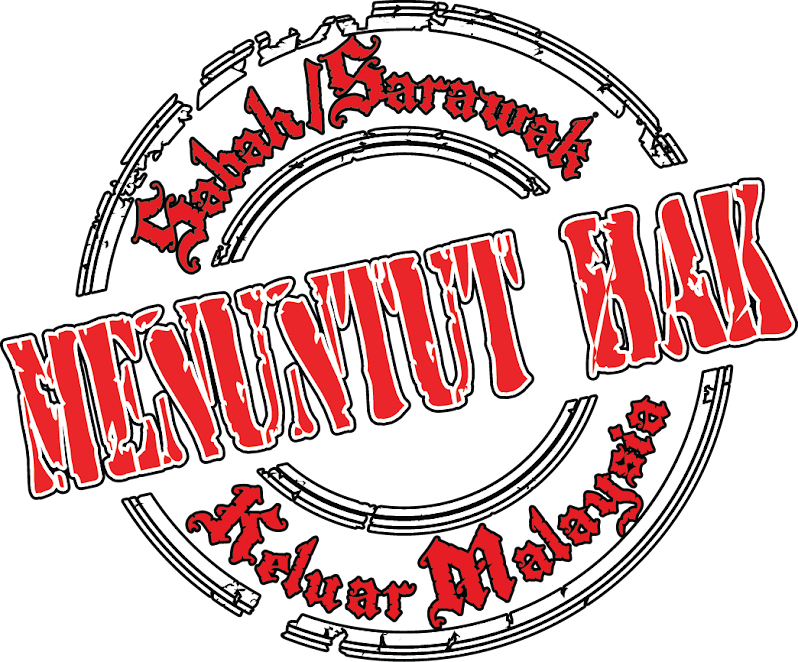
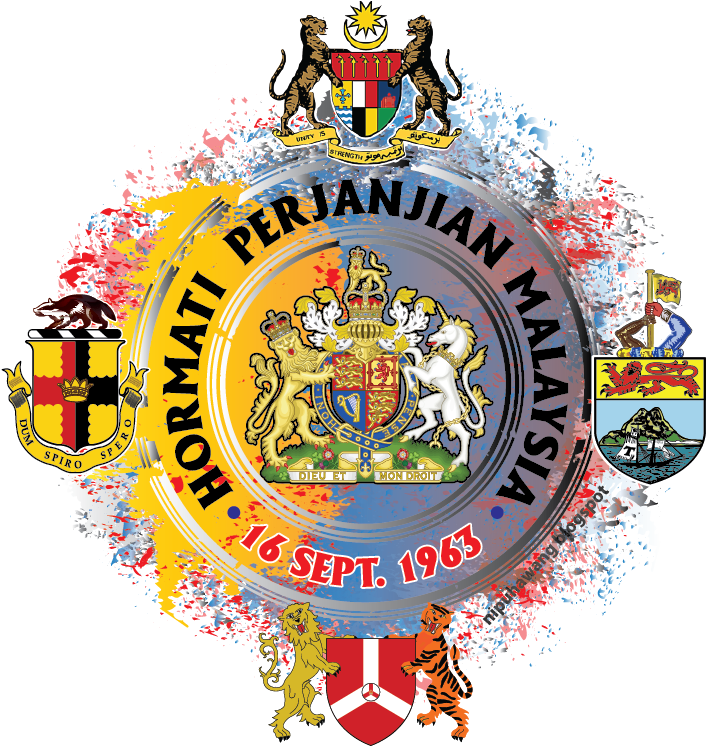

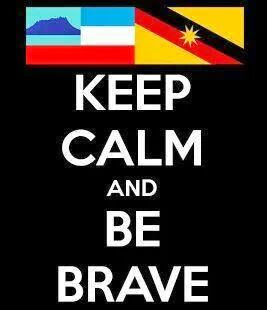
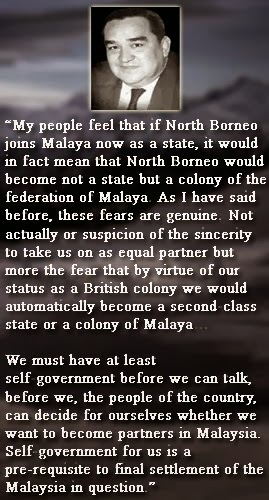
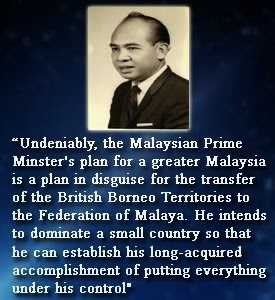



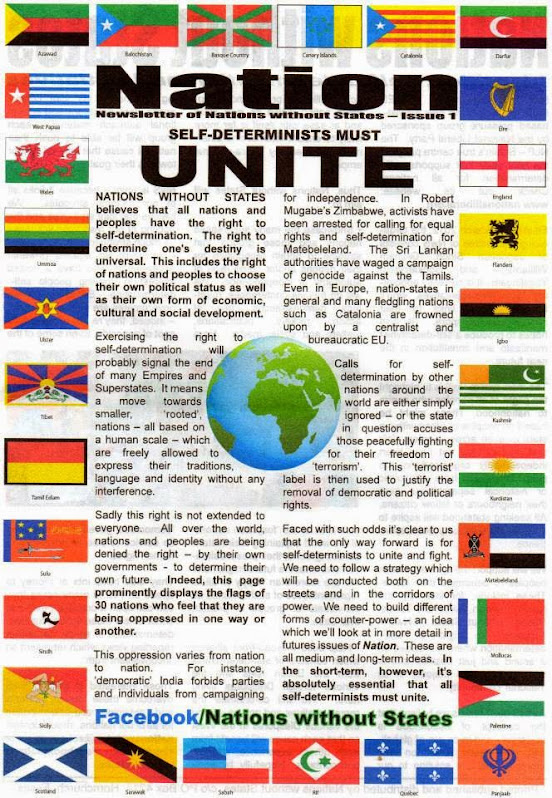

































.jpg)

